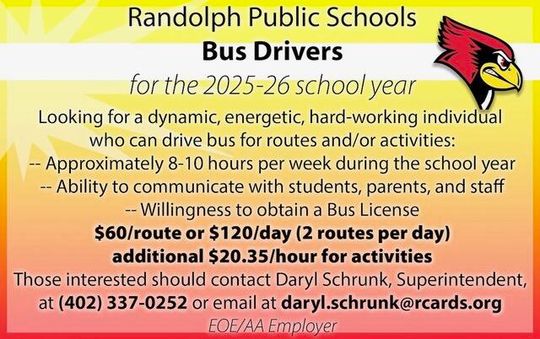RANDOLPH – Nearly 100 people attended a joint meeting between Randolph and Osmond’s school boards to discuss a potential high school football cooperative between the two schools for the 2024 season.
Osmond is not fielding a varsity football team due to a lack of players in 2023 and will need to find a school to co-op with by Nov. 1 to file the appropriate paperwork with the Nebraska School Activities Association.
After a short presentation by administrators with enrollment and participation numbers, patrons voiced their opinions during the 90-minute meeting Monday.
More than 20 people spoke publicly with some against the co-op, some for the co-op and others with mixed views.
Even if the two schools combined for high school football, it would remain eight-man and in the same class.
“It’s not a participation thing. We’re really lopsided enrollmentwise. We have a really high enrollment of girls and a really low enrollment of boys,” Osmond K-12 Principal Kurt Polt said.
Brandi Bartels, Randolph’s high school principal and athletic director, said Randolph’s Junior High football participation may be low in the coming year or two as well.
The two schools already co-op Junior High football and basketball, and high school basketball.
Procedures for a new co-op would be similar to those ongoing with Osmond. Both facilities would be utilized and transportation would be worked out by the coaches. Ideally, coaches would be selected from both schools.
“It does depend on the staff at both schools, what staff we have staying for the following year, what we currently have, and their areas of expertise and experience,” Bartels said with coaches selected in the spring for all teams.
Mascot or team colors must be chosen for the combined team. For example, the high school boys and girls basketball teams were known as the Hawks with the name and mascot chosen by students from both schools.
Financial aspects concerning expenses and receipts would be covered in the same way.
Some Randolph parents and students spoke up against an additional co-op with Osmond, citing scheduling and transportation issues, and unfair playing time.
Joe Wortman, Randolph, said his son played every minute of every game in his junior year, but things were much different when Randolph co-oped with Osmond for his senior year last season.
“Me as a parent, yes, very upset. Am I for competition? Yes. Can you tell me all four who played above my son was worlds ahead in competition and deserved it? No. They were all the same. Play them all. It’s a transition year. What’s it going to hurt when you’re getting beat (by) 30 points? Throw the kids in. We had juniors, sophomores playing varsity, not playing JV, not getting any minutes on both. What does that do for this year? Kids stop going out.”
Dayton Winkelbauer said all of his classmates quit the team because they didn’t get a chance to play.
But Ryan Engel, the assistant coach of last year’s boys team, said it wasn’t an us-vs.-them situation.
“Once the season gets rolling, we don’t see Randolph kids and we don’t see Osmond kids; we see Hawks. You can believe it or don’t believe it, but that’s how it worked for me. From year to year, you’re going to see shifts. There’s going to be years when we might have bigger numbers and it might not look like any Osmond kids on the field.”
Eric Brown, who coaches Junior High football among other sports, agreed.
“When it comes to the co-op stuff, just like if you’re one school, the best kids play,” he said. “From a coach aspect, we’re looking at who we see at practice, who we see in the games who give us the best opportunities.”
Many of those in attendance said the co-op has the ability to force more competition for those playing spots, making players earn playing time instead of just a guarantee.
Bryce Reimers, Randolph, said during his high school years, 50 kids played football.
“Guess what? Freshman, sophomore, even junior season, you weren’t playing unless you were really good. It made you earn it. We’re half that size with both kids combined. It’s going to push them harder, It’s going to make them earn it. It’s going to produce better athletes, better teams, everything,” he said.
Competitiveness and striving for success goes beyond a playing field or court, said Denton Kuhl, Randolph.
“There’s been some very successful people that have come from Randolph and I’m sure Osmond too who were successful in sports,” he said.
Unfortunately, Randolph’s culture of winning has been lost over the years, Reimers said.
“Let’s face it. Football in Randolph? How many wins have we had in the last five years? Not very many. We’re missing a piece or two. If we could bring those kids in, they might be successful. If you continue to lose and lose and lose, when they become adults, are they going to be driven to want to better themselves to work for that promotion, to do all that?” he said. “This puts them in a position to deal with people, learn how to adapt, change, better themselves. I think we need to explore it. I think we need to try it.”
.jpg)










